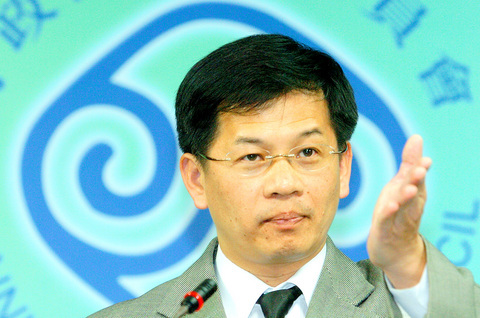In the wake of criticism that the government is violating freedom of press by banning Chinese journalists from Taiwan, the Mainland Affairs Council (MAC) countered yesterday with an attack on China's tight control over news coming from Taiwan, and requested that it lift bans on the Internet Web sites of two local newspapers.
"China's attitude toward the media is diametrically opposed to the principle of press freedom. This is what actually deserves criticism," MAC Vice Chairman David Huang (黃偉峰) said yesterday during a press conference.
He said that for starters China should "at the very least" lift Internet restrictions placed on the China Times and United Daily News. China blocks virtually all Taiwanese online news sites.

PHOTO: SEAN CHAO, TAIPEI TIMES
The council has protested these bans on several occasions, particularly in the wake of the "Anti-Secession" Law that Beijing recently adopted.
Council Chairman Joseph Wu (吳釗燮) had said during an interview with the Taipei Times last month that the removal of internet bans was the first step towards demonstrating a respect for public opinion and repairing the damage rendered by the Anti-Secession Law.
Similarly, Huang also said yesterday that the government's primary motivation in allowing Chinese correspondents to be stationed in Taipei was to promote bilateral ties by way of increasing China's understanding of Taiwan.
Huang's remarks came on the heels of the council's recent decision to suspend permits allowing Chinese state-run Xinhua News Agency and the People's Daily to post correspondents in Taiwan.
Huang noted however that its stated goals had not been achieved and had instead served to further strain relations by bringing about misunderstanding.
The council cited the distortion of information and the negative impact the reports had on cross-strait relations as reasons for the ban.
Xinhua News Agency's Taipei correspondent Zhang Mei (
Zhang said that the decision had come as "a shock" and that the council had not contacted her beforehand.
Despite the council's accusations that Xinhua often distorted the truth, she defended Xinhua's reports as "objective and balanced" and said that they had not deviated from their journalistic professionalism.
Another Chinese correspondent posted in Taipei yesterday said on condition of anonymity that the council's decision had made a "joke" of Taiwan's democracy and was a setback for cross-strait ties.
The reporter said that it was untrue that the Chinese media reported only on the negative aspects of Taiwan.
Huang made clear yesterday however that the council was not in anyway clamping down on negative reporting but rather the distorted and manipulative handling of news reports and the subsequent "negative impact" that such reporting had on ties.
"Clear and accurate information is best for cross-strait relations?as for whether the reports reflect negatively or positively [on Taiwan], I don't care," Huang said yesterday, citing reports that Xinhua had carried saying Taiwan welcomed the Anti-Secession Law despite several public opinion polls to the contrary.
He reiterated that the suspension was temporary and that it was motivated by the council's overall assessment of journalistic interactions across the Taiwan Strait.
He said that he hoped to see some regional Chinese media outlets posted in Taiwan.

The Ministry of Foreign Affairs (MOFA) yesterday voiced dissatisfaction with the Comprehensive and Progressive Agreement for Trans- Pacific Partnership (CPTPP), whose latest meeting, concluded earlier the same day, appeared not to address the country’s application. In a statement, MOFA said the CPTPP commission had "once again failed to fairly process Taiwan’s application," attributing the inaction to the bloc’s "succumbing to political pressure," without elaborating. Taiwan submitted its CPTPP application under the name "Separate Customs Territory of Taiwan, Penghu, Kinmen and Matsu" on Sept. 22, 2021 -- less than a week after China

ALIGNED THINKING: Taiwan and Japan have a mutual interest in trade, culture and engineering, and can work together for stability, Cho Jung-tai said Taiwan and Japan are two like-minded countries willing to work together to form a “safety barrier” in the Indo-Pacific region, Premier Cho Jung-tai (卓榮泰) yesterday said at the opening ceremony of the 35th Taiwan-Japan Modern Engineering and Technology Symposium in Taipei. Taiwan and Japan are close geographically and closer emotionally, he added. Citing the overflowing of a barrier lake in the Mataian River (馬太鞍溪) in September, Cho said the submersible water level sensors given by Japan during the disaster helped Taiwan monitor the lake’s water levels more accurately. Japan also provided a lot of vaccines early in the outbreak of the COVID-19 pandemic,

Kaohsiung Mayor Chen Chi-mai (陳其邁) on Monday announced light shows and themed traffic lights to welcome fans of South Korean pop group Twice to the port city. The group is to play Kaohsiung on Saturday as part of its “This Is For” world tour. It would be the group’s first performance in Taiwan since its debut 10 years ago. The all-female group consists of five South Koreans, three Japanese and Tainan’s Chou Tzu-yu (周子瑜), the first Taiwan-born and raised member of a South Korean girl group. To promote the group’s arrival, the city has been holding a series of events, including a pop-up

A home-style restaurant opened by a Taiwanese woman in Quezon City in Metro Manila has been featured in the first-ever Michelin Guide honoring exceptional restaurants in the Philippines. The restaurant, Fong Wei Wu (豐味屋), was one of 74 eateries to receive a “Michelin Selected” honor in the guide, while one restaurant received two Michelin stars, eight received one star and 25 were awarded a “Bib Gourmand.” The guide, which was limited to restaurants in Metro Manila and Cebu, was published on Oct. 30. In an interview, Feng Wei Wu’s owner and chef, Linda, said that as a restaurateur in her 60s, receiving an